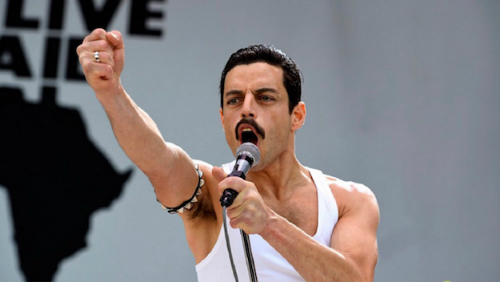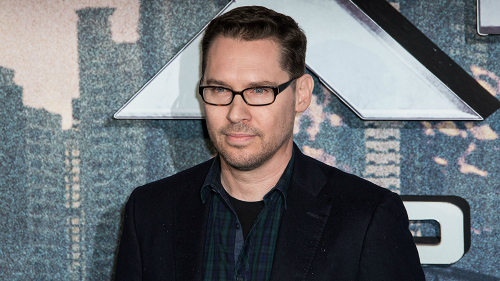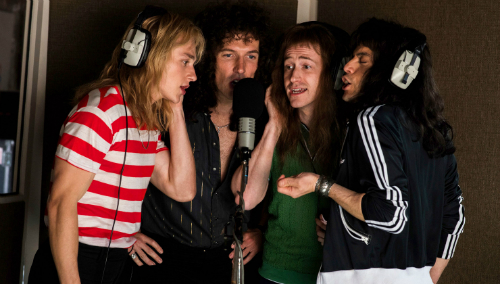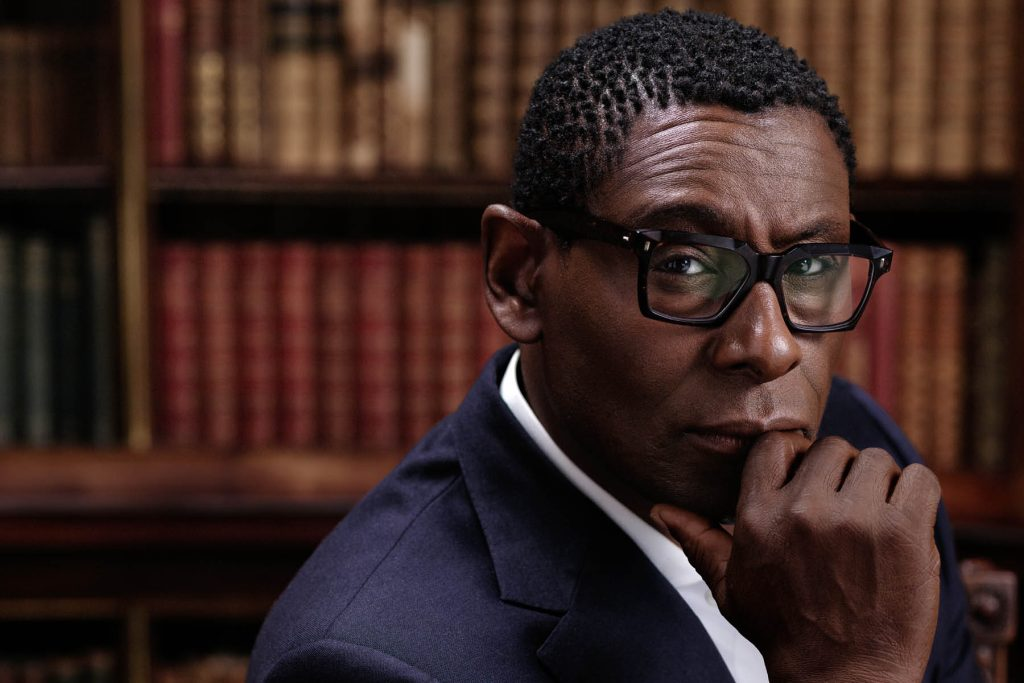Movie Review – ‘Bohemian Rhapsody’

Queen is back in the public consciousness! Time to bust out those Greatest Hits albums.
Freddie Mercury defied stereotypes and shattered conventional notions of what the lead singer of a rock band could be. The result launched his band into worldwide success and made him one of the most beloved entertainers on the planet. Though Queen undoubtedly became an unparalleled music sensation, their rise to fame wasn’t exactly an easy one. In Bohemian Rhapsody, audiences get to see all of the anger and frustration that came with being in one of the most celebrated rock bands of all time.
Though the film is essentially about the rise of Queen, the narrative of the movie really focuses on the extraordinary life of Freddie Mercury. We see his upbringing, his family members, his aspirations, his insecurities, and his desire to leave his old life behind. Mercury was running away from his life – going so far as to legally change his Parsi family name, Farrokh Bulsara – but he was able to find solace in the music he created, and on the stage which he performed on. Though Freddie Mercury is clearly a musical icon, I will admit that I didn’t know much about him. This movie was able to take a larger-than-life performer, and humanize him in such a grounded and compelling way. I really enjoyed the insight into his personal life.
Of course, Mercury is brought to life by an amazing performance by Rami Malek. Though I still would have loved to see what Sacha Baron Cohen could’ve done with the role, Malek absolutely kills it as the pop culture legend. Malek captures the spirit of Freddie Mercury brilliantly. Not only does the talented actor look the part, but he also hired a movement coach to perfectly capture all of the subtle nuances of Mercury’s likeness. Malek did an excellent job of portraying Freddie Mercury, and his outstanding work in this film makes me want to go back and check out his work in Mr. Robot. I’m not sure if Malek will get any awards recognition for his performance, but I bet he will be getting more leading offers due to his incredible work.

But Freddie Mercury couldn’t achieve mainstream success on his own; the other band members of Queen get plenty of time to shine in this film. We get to see how the band formed, how they challenged each other, how they wrote music together, how they performed together, how they pushed each other and how they often fought with one another. Brian May, Roger Taylor, and John Deacon were more than just band members to Mercury, they were his closest family. Gwilym Lee, Ben Hardy, and Joseph Mazzello did a solid job of bringing these rock legends to life, and they all had excellent chemistry together.
It was fascinating watching Mercury’s relationships with others, whether it was his friends, family, or his lovers. Though many have criticized that the film doesn’t truly explore Mercury’s more outrageous lifestyle. While Bohemian Rhapsody does show that Mercury would occasionally have wild nights, these portions of his life were glossed over and never fully explored. Which gives us a squeaky-clean interpretation of what was probably Mercury’s more eccentric way of living. This may have something to do with the fact that the surviving band members had a hand in producing the film, and had a say in what image they wanted everyone to be portrayed in. Kind of like how Straight Outta Compton chose to neglect some of the more darker and violent side of certain N.W.A. members.
It’s been said that the entire reason Sacha Baron Cohen left the project was because the filmmakers didn’t want to focus on Freddie Mercury’s wilder side. Before Bryan Singer became involved with the film, Stephen Frears was onboard for directing. He claims that his version of the film would have focused on Mercury’s “extreme lifestyle of debauchery” rather than on his career with Queen, and the Cohen’s interpretation of Freddie would have been “very outrageous.” Maybe this version of events would have been too extreme in the opposite direction, but it is still interesting to point out.

I think Bryan Singer was a good choice as a director. The subject matter that the movie does choose to focus on does match up with themes that Singer has explored before in his previous films. Feeling like a social outcast, being a misfit, wanting to feel acceptance, and how these feeling relate to one’s own sexuality, are all issues that Singer has tackled before, so it’s easy to see why this narrative may have suited him. However, it’s unclear as to how much of this movie was actually filmed by Singer himself.
Singer was actually fired as the film’s director back in December. Apparently, he was constantly clashing with Rami Malek, and often wouldn’t even show up to set. But he was able to retain his director credit due to DGA regulations. Dexter Fletcher took over directing duties, but it remains unclear as to how much of the film he had to finish up. Would the film be any stronger if it was completely under Singer’s singular vision? Did Fletcher fix up a mess that Singer left behind? We may never know. But the final result is a pretty decent film.
Yes, Bohemian Rhapsody is a fine film, but it isn’t exactly the foot-stomping celebration that I wanted it to be. The story is inherently interesting, but it isn’t all that engaging. For how impactful Queen was on pop culture and the music industry a whole, this movie doesn’t leave much of a lasting impression. I don’t know if this had anything to do with the tone or the overall mood of the film, but I just didn’t feel anything while watching this movie. Queen has such a legendary and iconic sound, and the film that traces their meteoric rise simply can’t capture that same energy.

I also didn’t quite enjoy the film’s pacing. Jon Ottman does a fine with editing the film, but I think the script itself glosses over chunks of time that would have been neat to see. For example, we spend very little time with Mercury when he was still a nobody before immediately jumping into his success as a rock star. And there are lots of other moments that feel as though they happen too quickly. I’ve only seen Anthony McCarten’s work on The Theory of Everything and Darkest Hour – both of which have pretty solid pacing – so I’m not sure what happened on Bohemian Rhapsody. The only thing I can imagine is that the filmmakers didn’t want to spend too much time focusing on just Mercury, so that they could cut back to the comradery between all of the bandmates.
My smallest gripe with the film has to do with Mike Myers’ role. Seeing his name in the credits of this movie got me excited. I was looking forward to seeing Myers on the big screen again. Yet his role in the film is so insignificant. He basically sits in one chair, without moving, in the same room, for just two scenes. Scenes which were probably shot back to back on the same day. I just felt as though his addition to the cast was unnecessary because his talents were terribly underutilized.
Despite having serious production troubles, Bohemian Rhapsody is still a solid film. Though the film itself wasn’t quite as great as I had hoped for, I was reminded of how absolutely fantastic Queen actually is. Their music was revolutionary, their performances were extraordinary, and their sound inspired millions of people around the world. Though Bohemian Rhapsody condenses the real-world events, focuses too much on a perfect fantasy-like finale, and doesn’t leave the impressions that you would want it too, it is still an enjoyable film. Even if this film gets forgotten with time, Queen will continue to live on as one of the greatest bands of all time.







